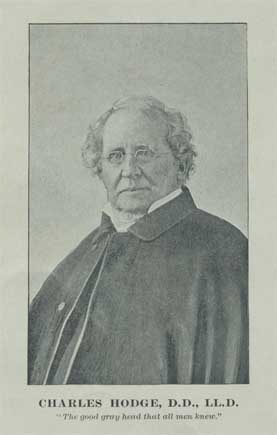Charles Hodge enters into eternity
 Early in July of 1878, on the pages of The Christian Observer, this brief note appeared under the title, “Calvinism and Piety,” :
Early in July of 1878, on the pages of The Christian Observer, this brief note appeared under the title, “Calvinism and Piety,” :
The Christian Union, which has no friendship for Calvinism, closes its article on the death of Dr. Hodge, as follows:
Dr. Hodge, who was the foremost of the old Calvinists in this country, was, in character, one of the sweetest, gentlest and most lovable of men. His face was itself a benediction. We doubt whether he had any other than a theological enemy in the world. Curiously too, the peculiar tenets of his theology were reserved for the class-room and for philosophical writings. In the pulpit he preached a simple and un-sectarian gospel; his favorite texts were such as “Believe on the Lord Jesus Christ and thou shalt be saved;” and his sermons were such as the most successful missionaries delight to preach in foreign lands. In Princeton he is regarded as without peer in the conduct of the prayer meeting. His piety was as deep and as genuine as his learning was varied and profound. The system of theology of which he was the ablest American representative seems to us, in some points, foreign to the teaching of the New Testament, but the life and personality of the man were luminous with the spirit of an indwelling Christ.
Words to Live By: May we all—those of us who name the name of Christ and who also claim that same biblical faith commonly called Calvinism—so find our maturity in Christ as to live in a similar way, luminous with the spirit of the indwelling Christ, pointing all men and women to the only Lord and Savior, Jesus Christ.
Image source: Frontispiece photograph of Charles Hodge, D.D., from The Right of Presbyteries Not to Be Annulled by Any Assumed Authority of the General Assembly: Their Relations to Each Other Defined by Dr. Hodge in the Princeton Review. New York: Anson D.F. Randolph & Co., 1896. The caption beneath the photograph, “That good gray head that all men knew.” is a line taken from a poem by Alfred Lord Tennyson, written originally in memory of Arthur Wellesley, the first Duke of Wellington (nicknamed “the Iron Duke”), and the poem subsequently is found used on behalf of a number of statesmen and others. Presumably as it was here used of Dr. Hodge, the point was to stress Hodge’s fidelity.
Pamphlet War: The Rights of General Assembly versus the Rights of Presbyteries
The PCA Historical Center has another pamphlet, which, except for the title, appears identical. It even has the same photograph, though the caption beneath the photo is taken from the next line of the poem, “That tower of strength Which stood foursquare to all the winds that blew!” The title of this second pamphlet is The Rights of General Assembly Not to be Annulled by Any Assumed Authority of the Presbyteries: Their Relations to Each Other Defined by Dr. Hodge in the Princeton Review, published in New York by E. B. Treat, 5 Cooper Union. Office of the Treasury Magazine, and also published in the same year, 1896.
There is mention of a third pamphlet that was part of this pamphlet war, but we have not been able to locate a copy of that third item yet. We plan to post the text of both of these pamphlets, in essence, Hodge against Hodge, later this summer on the PCA Historical Center’s web site.
Tennyson’s poem, used in part to caption those two pamphlets:
“The statesman-warrior, moderate, resolute,
Whole in himself, a common good;
Mourn for the man of amplest influence,
Yet clearest of ambition’s crime,
Our greatest, yet with least pretence,
Great in council and great in war,
Foremost captain of his time,
Rich in saving common-sense,
And, as the greatest only are,
In his simplicity sublime.
Oh, good gray head which all men knew!
Oh, fallen at length that tower of strength
Which stood foursquare to all the winds that blew!”
